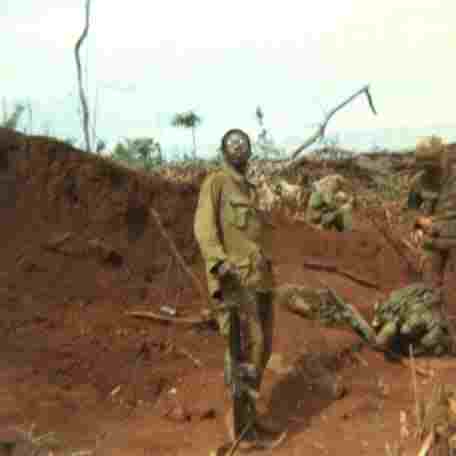
Big City, Little
Quan Loi (Viet Nam)
Quan Loi
by Marc Levy

For twenty years, wherever I've lived--and there have been some gritty places--the shrine, a traveler's tent of fading patches and brown-edged papers, a sizzling nest of unspent bullets, blue-boxed combat decorations, dog tags, photographs by the hundreds, mud-licked letters encased in plastic: soon enough, this bookcase totem of portable relics is carefully restored.
Once, after a hectic cross-country move, I spent one entire day shoving each war gone item back into place. The ghostly clink of shells, the papery hush of fading combat records, medals and ribbons strangely aromatic, all fed the hunger of my task. Hours later, cloaked in leathery dust and sweat, at the very moment of completion, a sharp voice said, 'I don't need you anymore.'
Swiftly, I emptied shelf after bitter shelf, tossing the once treasured items--left, right, left--then replanting the deep wooden case with row upon row of paperback books. One photograph remained, just one, and the delicate wrapping paper, keepsake from An Loc.
Soon afterwards, by ill fortune or good, my friend, Capt. John Davis--heavy combat, shrapnel-scarred, Vietnam, Class of ‘70--sent me a photograph--color, mind you--of himself and Sergeant First Class Richard R. Deller. We called Deller ‘Black Goliath.' Thank you much. I recognize him, I wrote back.
Hunched over, bare-chested, face invisible, like a man shielding himself from wind-whipped fire: that's Capt. Davis in the background. Now look closer. You see the color of the clay blood dirt? That's Quan Loi Red. In dry season, its fine dust clogged our weapons, rouged our skin; in rain, we slept in its thick, dark mud. Patrols, medic, ambush, monsoon. Not long ago, I went back.
Quan Loi, once a great, sprawling American base is gone now, gone, flat as a field. Emerald weeds haunt the vacant landing strip once jammed with choppers full of shocked-out troops; medivacs ferried in casualties and KIA. These days, under the pummeling sun, peasants hoisting primitive tools ardently furrow the hard, cracked earth. I took photographs: The skulls of their dead inhabit their faces.
Now this photograph, this one here, war-torn, creased and scuffed, finger print-ruined, the young black soldier, stately and militant, butt of his rifle balanced hard on his boot, look at him: You can feel the terror moist in his mouth, the heat of combat carved on his heart, the teenage-grown-man-black-pride blistering, 'Who you looking at? Them Vietcong never did me no wrong.' Uniform soaked from a half-day's march, youthful sneer, perfect kiss to a bomb crater blast. 'How old were you, son? Nineteen?' Capt. Davis: old at thirty.
I wrote Deller, recalled my trips to Quan Loi, An Loc, the endless adventures, flashbacks, the murderous rage. He understood. Sixteen confirmed kills. He messed with the bodies once we were done.
Good to hear from you, he wrote. I've been a cop going on twenty years. A little dangerous. You know how it gets. Take care yourself. Every word in boldface capital letters.
Sometimes, looking at his photo, I feel the Quan Loi red sifting under my skin, taste its gritty dust between my teeth, feel the blood surge up my throat. That's when I hope with all my heart that Sergeant First Class Deller is a good cop. He was a very good soldier, indeed.